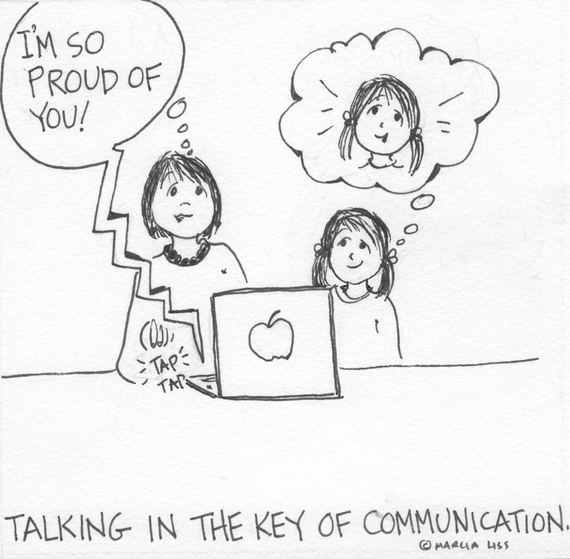You may have heard of aphasia if you know someone who has had a stroke or brain injury. The person is still competent and knows what he wants to say, but he can't talk and may not be able to understand others who are speaking to him. He may have trouble with reading, writing and coordination. With intensive therapy and time, he may recover some, or maybe almost all, of his former functioning. Think Illinois Senator Mark Kirk.

Talking to my granddaughter -- cartoon by Marcia Liss
Childhood apraxia of speech (CAS) is aphasia's lesser-known child. You have probably never heard of it. But because my twin granddaughters have been diagnosed with apraxia, it is part of my daily life. In my granddaughters' case, their language and speech never developed properly. Their brains have difficulty planning to move the body parts (e.g., lips, jaw, tongue) needed for speech. They know what they want to say, but in the case of the one more severely affected, she can't coordinate the muscle movements necessary to speak those words. She also can't coordinate the muscle plan needed to sign. Her twin exhibits language delays as well, particularly with expressive language and word recall.
The best way I can visualize their problem is that there are connections in their brains that did not develop properly. So despite reading to them, talking to them, going to enriching activities, spending countless hours taking them to private therapists, and loving them to pieces, they still can't share what they are thinking.
My many years of experience founding and then running Cherry Preschool, an inclusive early childhood program, only partially prepared me for what it feels like to be the one who deeply loves that child with special needs. My grandchildren have moved from preschool, where inclusion was embraced by the children and staff alike, to public school, where inclusion is complicated by a curriculum that needs to be mastered and untrained staff that still think of inclusion as "being in the same room." This transition has made me even more passionate about advocating on behalf of kids with apraxia and others who can't speak for themselves.
What I have learned about public school is that some teachers and paraprofessionals (aides) are qualified to do this work but some are not; some are kind while others lack the patience and empathy required; some are well-meaning but have no training or guidance. Probably all feel unsupported by a system that expects them to manage more and more challenges while also meeting increasingly rigid and demanding standards and tests, which are also used to measure how effective they are.
Yes, there is plenty of pain and frustration to go around, but I feel compelled to advocate for these children who cannot share why they cried that day, or how their teacher made them feel unworthy, or how an aide mistreated them in a misguided effort to impose discipline.
How am I supposed to feel when a typically developing child reports that an aide was very mean to my granddaughter in the hallway, at lunch, and during gym? Or when my granddaughter's iPad, which contains a program that gives her a voice, comes home fully charged day after day? Or when the special education teacher thinks she cannot teach reading to my granddaughter, who is reading at home? Or when my granddaughter, who has a dedicated aide, is still left out of a field trip to the zoo? I could go on and on, but the larger question is this: How can we right these wrongs for children who can't even tell us they are happening?
For me, June is just like every other month of the year. But I wanted to use this month to be their voice and remind you that there are many children like my granddaughters who are so much more capable than they seem to be. And when one of them declares, "I love Grandma," there are no sweeter words.
I invite you to join my Facebook community and subscribe to my newsletter.
